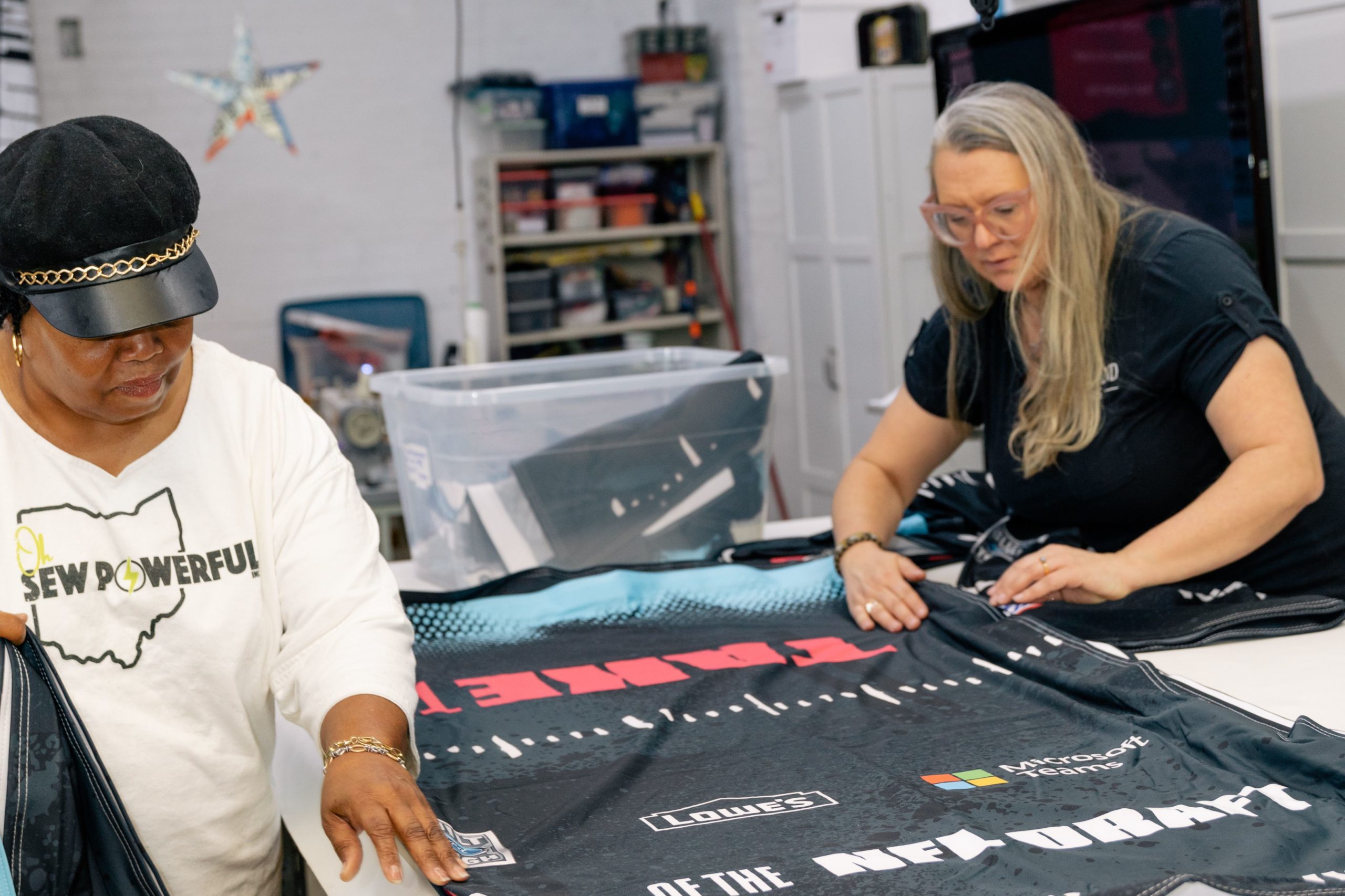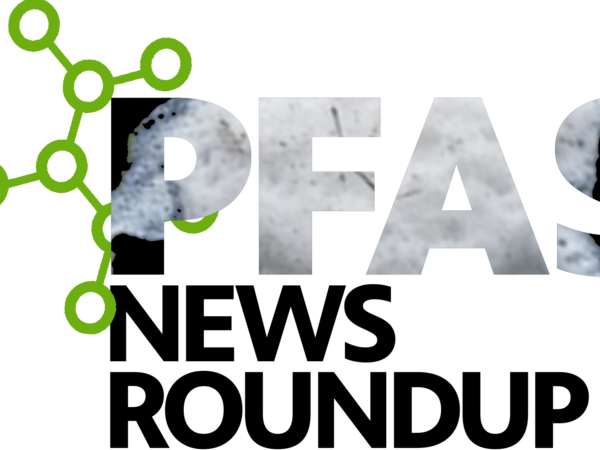
By Lee Chilcote, The Land
This story is part of a collaborative series, from the Institute for Nonprofit News, The Land and four other news partners, examining climate resilience across the Great Lakes. This reporting was made possible with support from the Joyce Foundation.
While meeting with a local farmer two years ago, Eric Diamond of Central Kitchen, a food business incubator in Cleveland, Ohio, learned that the farmer wasn’t able to sell all the carrots in his fields. Some of the carrots – while perfectly nutritious – weren’t the right size or shape for grocery stores’ and restaurants’ specifications. That sparked a question, and a business idea was born.
“I said to him, ‘What do you do with the carrots?’ and he said, ‘We leave them to rot in the fields because we don’t have an end market,’” said Diamond. “So, I said, ‘What if we buy the ones that don’t meet your specifications, and we process them and sell them to school districts?’”
Soon afterwards, the farmer, Wayward Seed Farm in Fremont, Ohio, began taking the carrots that would otherwise have been thrown away and dropping them off at Central Kitchen. They processed the carrots into 5-pound bags and sold them to school districts. Recently, with the help of a $30,000 grant from Circular Cleveland, Central Kitchen bought a new commercial grade food processor called a Robot Coupe which allows them to process carrots much faster.
“We had five people with knives cutting up carrots and dumping them into bags,” said Diamond. “We could only do 1,500 pounds in an eight-hour shift. Now, we can do 1,500 pounds in a couple of hours – and no calluses.”
Business and civic leaders in Cleveland like Diamond are turning to a new idea termed the “circular economy” – premised on reusing materials and turning them into new products rather than throwing them away – to help grow jobs and businesses, reduce waste, and improve the environment. Those would be welcome benefits in Cleveland, which is one of the poorest big cities in the country, with a poverty rate of 29.3% in 2021, according to the U.S. Census. According to the International Labor Organization, the circular economy could create a net increase of six million jobs globally by 2030.
Aiming for economic growth
To help Cleveland grow its circular economy, last year the Robert Wood Johnson Foundation awarded the city a $476,000 grant. In the past two years, Circular Cleveland, a partnership between the city and the nonprofit Cleveland Neighborhood Progress, has hired neighborhood ambassadors to promote the initiative, given out community grants to help residents with reuse projects like composting, and hired consultants to create a circular economy roadmap for the city.
Although it’s too early to say what the effects of Circular Cleveland will be, it’s already beginning to generate some economic activity. Students and alumni from Case Western Reserve University in Cleveland recently won a pitch competition hosted by the manufacturing group MAGNET for their startup, CLEANR, which has developed a filter that removes microplastics from the water flowing out of washing machines.
Cleveland Sews, a sewing company that operates out of a renovated warehouse on Cleveland’s east side, is partnering with the Cleveland Cavaliers and the NFL to turn recycled banners into handbags with the help of a $3,000 Circular Cleveland grant.
“What I’ve realized is that the opportunity is so much bigger, and working with the NFL and the Cavs to create products has opened my eyes to that,” said owner Sharie Renee, who is planning a line of sustainable handbags and other products.
“Changing our systems to be less wasteful and to have a regenerative quality will make our communities more resilient and revitalize the natural systems around us as well,” said Sarah O’Keeffe, sustainability director with the city of Cleveland. “That of course helps everyone in our community.”
Policy changes can curb waste
While community-led initiatives like Circular Cleveland are helpful, experts say state and national policy changes are needed to transition our economy from a take-make-waste model.
Some states have passed extended producer responsibility (EPR) laws holding producers responsible for what happens to their products. For example, California recently passed an EPR law that after 2032 will outlaw packaging that can’t be recycled or composted. Oregon, Maine, and Colorado have similar laws, and more than a dozen states are currently considering EPR legislation.
“The kinds of policies and frameworks we need to incentivize these types of circular businesses, they don’t exist yet in the U.S.,” said John Holm, director of strategic initiatives for Pyxera Global, a nonprofit organization that helped to create Cleveland’s circular economy roadmap. “So, what you have is a bunch of one-offs everywhere. It’s all nascent, and to say anything else would be a lie. But what I can say is that companies are paying attention to it.”
Roadmap to recovery
The new Circular Cleveland roadmap identifies four key areas for the city to focus on: circular manufacturing, remediating pollution, circular built environment (deconstructing and recycling old buildings), and getting more value from resources (including food waste composting). Over the past year, Circular Cleveland has provided $100,000 in business grants to help companies that are part of the circular economy to grow their businesses, according to Divya Sridhar, climate resiliency and sustainability manager with Cleveland Neighborhood Progress.
One of those projects is a pilot composting program at the West Side Market, a public market located near downtown. Cleveland currently does not have a citywide composting program, so unless residents and businesses compost on their own, all the city’s food waste ends up in landfills. According to the U.S. Food and Drug Administration, 30-40% of the food supply is wasted. This worsens the climate change crisis with its significant greenhouse gas (GHG) footprint.
Beginning in January, the city is spending $60,000 to bring composting to the market. The composting and soil company Rust Belt Riders will conduct a waste audit, develop the composting pilot, and study how it can be improved and expanded to other parts of the city. Rust Belt Riders is also partnering with the Hunger Network of Greater Cleveland to identify fresh, usable food that can be diverted to hunger centers and food pantries through the app Food Rescue Hero.
“We’re trying to make sure all food at the West Side Market goes to the highest and best use,” said Daniel Brown, co-founder of Rust Belt Riders and Tilth Soil, which makes soil from local compost.
Circular Cleveland also awarded $30,000 to a sustainability consulting group, Venture Forward Strategies, to help small- and medium-sized manufacturers divert materials from the landfill. And Circular Cleveland hosts twice-a-month fix-it clinics to help people fix household items like vacuum cleaners, furniture, and clothing.
Around the Great Lakes
With New York, another Great Lakes state, also weighing an EPR law, Mark Fisher, executive director of the Council of the Great Lakes Region, is optimistic that more states will pass these laws in the coming years. “Most of Canada is moving to the extended producer responsibility model,” said Fisher, who is based in Ontario. “[Canada] is a year or so ahead of where we see conversations in the U.S. in the Great Lakes region.”
Currently, there are no EPR bills being considered by the Ohio, Illinois, or Michigan state legislatures, but Michigan has a longstanding bottle deposit law that gives consumers 10 cents for every bottle they recycle and Wisconsin’s E-Cycle program recovers millions of pounds of technology waste every year. As state legislatures debate these bills, however, some companies aren’t waiting around to put circular economy ideas into practice.
Chicago-based software company Rheaply recently acquired the Materials Marketplace, a free online platform allowing businesses and organizations to buy and sell waste and byproduct materials. The construction industry is one of the biggest contributors to pollution and waste, accounting for 40% of global emissions and nearly 20% of the waste in U.S. landfills, according to Rheaply. So far, the platform, which is active in Ohio, Michigan, Ontario, Tennessee, Washington, and Austin, Texas, has diverted 9,200 tons of waste from landfills.
“There are real savings to diverting and not sending something to a landfill,” said Garr Punnett, chief impact officer at Rheaply. “Something you’d offer for free may be valuable to another organization.”
As an example, Punnett cited a Michigan-based manufacturing company that generates roughly ten 70-pound bags of sawdust every day and recently posted that material on the marketplace. If they’re able to sell it, he said, they’ll save $1,000 per month in landfill costs.
Government programs that provide grants and other technical assistance to businesses can help grow the circular economy, experts say. In Michigan, the state’s Department of Environment, Great Lakes, and Energy (EGLE) launched NextCycle Michigan two years ago to provide grants to circular economy businesses. NextCycle’s goal is to increase the state’s recycling rate to 45% (in 2019 it was 18%, while in 2018 it was slightly higher at 19.3%). In October, EGLE awarded more than $2 million in grants to recycling, reuse, and renewable resource projects.
This year’s grantees include Glacier, a San Francisco-based company that received $367,000 for demonstrating robotic sorters at a recycling facility in Oakland County, Michigan, and the Detroit-based Industrial Sewing and Innovation Center (ISAIC), which received $166,000 to upcycle textile waste into felted fabric and create a business plan for scaling this model across the state.
Rebecca Hu, co-founder of Glacier, said her company is using artificial intelligence and robots to bring recycling to more communities and create high-skill jobs at recycling facilities. “Early stage startups are always a risk, but by having the support of EGLE, we can essentially de-risk expansion,” she said.
Jennifer Guarino, CEO of ISAIC, said the EGLE funding will be used to pay for equipment that will help her organization turn discarded clothing into new products. The group, which is active in nine states, has a 12,000-square-foot manufacturing facility in Detroit where they’ve so far trained 45 people in their industrial sewing certification course. Last year, they created 10 new jobs, each of which pays an average of $16 per hour.
Matt Flechter, recycling market development specialist with EGLE, said NextCycle is aimed at creating jobs for people who need them. “This is fitting into our goals of creating a diverse workforce, of finding ways to develop job opportunities especially in places like Pontiac, Detroit, Benton Harbor, and Flint,” he said. “We don’t want to create a new system of managing waste where we’re leaving people behind.”
This story is part of a collaborative series from the Institute for Nonprofit News, Planet Detroit, Tostada Magazine, Energy News Network, The Land, and Borderless Magazine examining climate resilience across the Great Lakes. This reporting was made possible with support from the Joyce Foundation.
Lee Chilcote is executive editor and founder of The Land. To learn more about Circular Cleveland and get involved, visit www.circularcleveland.org.
Catch more news at Great Lakes Now:
These 3 Detroit restaurants are tackling climate change in the kitchen
Ann Arbor sends partially treated wastewater into river
Featured image: Paula Coggins of Oh Sew Powerful (left) and Sharie Renee of Cleveland Sews (right) sew leftover materials from Cleveland’s NFL Draft into handbags. (Photo by Sophie Kannberg courtesy of Institute for Nonprofit News)




